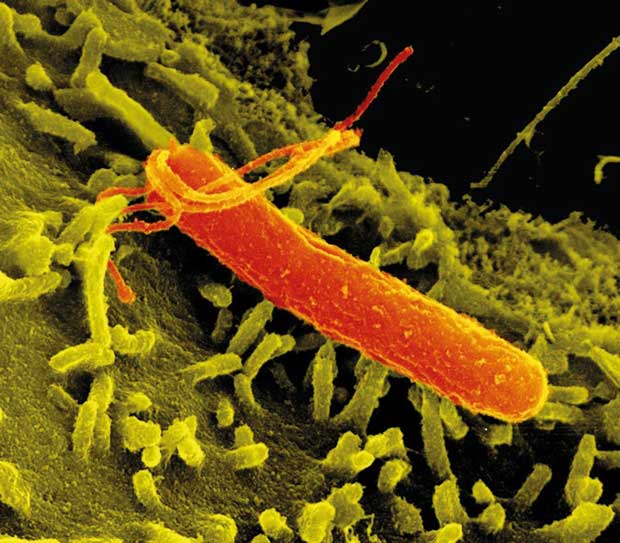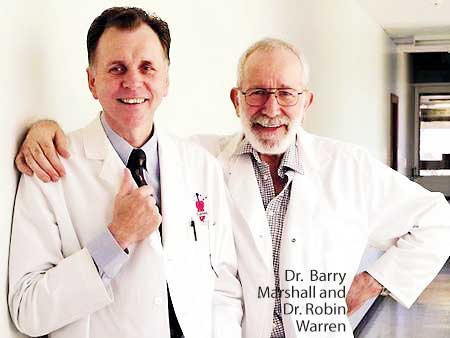26 Jan 2018 - {{hitsCtrl.values.hits}}

 Peptic ulcers are wounds in the surface lining of your stomach, causing severe burning sensation. In addition, they may cause bleeding by eroding into blood vessels and is known to cause fatal massive hemorrhages in some patients. Until very recently, doctors thought that the sole cause for peptic ulcers was mental stress. So the treatment of choice for patients diagnosed with peptic ulcer disease at that time was antidepressants, and ultimately, surgery to remove the diseased stomach. So when Dr’s Barry Marshall and Robin Warren made a claim that these ulcers were not, in fact, caused by stress, but by a bacterium, instead of it being openly received, they were looked down with skeptism, and at times, were ridiculed openly.
Peptic ulcers are wounds in the surface lining of your stomach, causing severe burning sensation. In addition, they may cause bleeding by eroding into blood vessels and is known to cause fatal massive hemorrhages in some patients. Until very recently, doctors thought that the sole cause for peptic ulcers was mental stress. So the treatment of choice for patients diagnosed with peptic ulcer disease at that time was antidepressants, and ultimately, surgery to remove the diseased stomach. So when Dr’s Barry Marshall and Robin Warren made a claim that these ulcers were not, in fact, caused by stress, but by a bacterium, instead of it being openly received, they were looked down with skeptism, and at times, were ridiculed openly.
“Stomach ulcers made by bacteria?” queried critics. “Everybody knows that the environment in the stomach is so acidic that a bacterium cannot survive within!” But the two doctors were not to be discouraged. They stood by their theory and went on to prove it to the world, leaving us with another inspiring story of fighting for what you believe in, even when the whole world stands on the other side, ready to laugh at you at the slightest mistake. This is the story of the Dr.S Marshall and Warren, and the small bacterium, Helicobacter pylori, the discovery of which revolutionized the fate of medicine.
The Beginning
30-year-old Dr. Marshall was doing his clinical rotation in Royal Perth hospital in Australia, when he stumbled onto the path of Dr. Robin Warren, who was a pathologist. He had recently studied several tissue samples taken from the stomach lining of patients who were having peptic ulcer disease, and unbelievably, had observed a new type of bacterium on many of the samples.
This picked Marshall’s interest because among the patients that Warren treated he found the new bacterium. The patient was experiencing unbelievable stomach pains which did not respond to treatment. They ultimately had to refer her to a psychiatric. She was given antidepressants because they suspected the usual culprit ‘stress’ caused her stomach pains. So began their partnership, with years of laboring over the mysterious organism and if it had any relationship with peptic ulcers, ahead of them.
Roadblocks
By 1982, the two doctors had spent hundreds of hours in a lab, looking under a microscope or in a clinic, examining patients with stomach ulcers, that they were certain that they had found the link between the bacterium and peptic ulcers. They decided that it was time to share their findings with the rest of the medical community; especially because with their new finding, instead of letting the patient experience the risk of surgery, they could cure the disease simply by eradicating the organisms through a course of oral antibiotics.
But the majority of the medical community, including the seasoned gastroenterologists, flatly refused to deviate from what they’ve believed throughout their carriers, that peptic ulcers are induced by too much stress, sometimes going as far as to ridicule the two doctors.
In addition, according to Dr. Marshall, due to the commonness of the peptic ulcer disease at the time, there were many companies in the medical field which earned millions because of the disease. They sold equipment that were used to perform surgery, and drugs which were mostly ineffective, to the patients. These companies lobbied against the doctors, safeguarding their profits being their singular priority.
Challenge accepted
The only way forward seemed to be by proving to the world once and for all that H. pylori indeed cause peptic ulcer, through infecting a healthy subject with it. Numerous previous attempts to infect animal models with the pathogen had failed, and it was unethical to use a human subject to intentionally cause him harm by infecting him with bacteria. So Dr. Marshall did the unthinkable, and made himself the test subject of his experiment. He underwent an endoscopy to prove that he was uninfected, and afterwards, drank a broth containing H. pylori, taken out from another patient’s stomach and cultured in the lab.
The results appeared sooner than he imagined. He had bloating and abdominal pain by the fifth day and had severe vomiting in another two. The symptoms worsened in the coming days. He suffered through the pain for fourteen days, without taking medication, only to take another biopsy, which to his utmost pleasure, was positive for the bacteria.
Nobel Prize
Now that they had absolute proof, they again published their findings, which changed the lives of so many people. Today, the accepted treatment for peptic ulcer disease is antibiotics, coupled with a drug which reduces stomach acidity.
The two doctors won the Nobel prize for medicine in 2005, and in his speech on receiving the prize, Dr. Marshall quoted Daniel Boorstin’s saying “The greatest obstacle to knowledge is not ignorance; it is the illusion of knowledge”. He explained that the reason so many specialists in the field were bind to the true cause of peptic ulcer, was because they believed they already knew the cause, and refused to think beyond what they were taught.
In addition to their contribution to medicine, Dr’s Warren and Marshall are another example of people who achieved greatness by going against the view of the majority, determinedly following what they believed was right, until the very end.
Helicobacter pylori is a small ‘S’ shaped bacterium which lives in the extremely acidic stomach mucosa. They have an enzyme which produces ammonia, neutralizing the acid layer around them. This also damages the upper lining of the stomach, which is resistant to acid, allowing the stomach acid to leak in and cause peptic ulcers. In addition to being the major cause of peptic ulcers, H. pylori also cause duodenal ulcers and are known to cause cancers in the stomach in the long term.
23 Dec 2024 9 minute ago
23 Dec 2024 14 minute ago
23 Dec 2024 59 minute ago
23 Dec 2024 2 hours ago
23 Dec 2024 2 hours ago